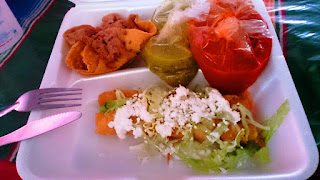A month before my birthday as I was looking for interesting books inside National Bookstore on a lazy Saturday afternoon, I spied Nick Joaquin's A Question of Heroes. Because I was still obsessing over the film Heneral Luna and have been on the lookout for materials about Antonio Luna, I bought the book without a second thought seeing that it tackles the revolutions first against Spaniards then against the Americans. That despite the book costing me PHP350, but I had no regrets because the book was well-written.
A Question of Heroes traces the series of revolutions that took place to where it all started, arguing that it was the creoles who started it all with their campaigns for the appointment of the native clergy. The execution of the GOMBURZA inspired privileged young men, the ilustrados, who obtained education, most of them in Europe, to establish a Propaganda movement which enlisted the sympathies of Spanish politicians. It was the highlight of the whole movement as one after the other these ilustrados made the nascent Filipino community proud by winning competitions and garnering accolades in international settings. And it is precisely because of the ilustrados' achievements later on culminating into a sense of nationhood that Nick Joaquin argues that the entire period from the Propaganda Movement up to the war against the Americans is just a single event aptly named the Revolution of the Ilustrados.
While it is undisputed that the ilustrados fanned the fire to nationalistic tendencies, I have reservations on this since the masses were discredited. I strongly suspect that this is because Nick Joaquin himself came from a privileged family and/or that he is a product of a series of brainwashing and mental colonization done by the Americans when they established the public school system in the Philippines. The book failed to investigate the Dagohoy rebellion and its significance in later revolutions.
What I liked about the book though is that it is very well-written, making it hard to put down. For this, the author really lives up to his title as National Artist for Literature. He writes unapologetically about the heroes we so admire in Philippine history, showing their great blemishes when in highschool all we ever know is their greatness and love for country. Nick Joaquin even goes far as to question that love. Is it really for the Motherland? What is referred to as Motherland?
The book touches on well-known personalities in the Philippines' pantheon of heroes and delving deep into controversies thus offering more insights into the humanity of these persons whose lives the average Filipino only reads from heavily purged textbooks. It touches on accidental heroes like Jacinto Zamora, on cowardly heroes like Graciano Lopez-Jaena who was unable to act on what he espoused, on arrogant and power-hungry heroes like Andres Bonifacio and Emilio Aguinaldo, on duplicitous and manipulative heroes like Apolinario Mabini, on heroes lost in time like Artemio Ricarte who brought the Japanese into the Philippines to drive out the Americans, and many more interesting stories.
We call them heroes. But how do we really define heroism? What makes a person a hero?
I remember as a college student and keeping an active blog on the now defunct Multiply site, a big figure in the History Department commented on what I wrote (if I remember correctly it was a review of the National Museum). Curious, I visited his Multiply site and found out that it was Dr. Zeus Salazar, proponent of the
Pantayong Pananaw, an intellectual movement that calls for indigenized social science perspective as opposed to the more popular Western positivist stances. In one of his writings, he differentiated between a "hero" and a "bayani". The first, for him, refers to someone with courage, wisdom, and strength. The latter is characterized by his/ her sacrifice and concern for others.
Bayani is rooted in the word
bagani which means warrior, someone who is ready to lay down his life to protect others.
In A Question of Heroes, we glimpse the selfish interests these "heroes" had and I think it is interesting and will make for a good debate on whether they are mere heroes or are worthy to be called "bayani".
On second thought, I recall a wonderful conversation I had with a fellow volunteer in the mapping project. He is a Psychology graduate and he points out that we the people at present times must not judge too harshly the people of the past because as the events unfolded before them, they were characters within a story wherein the ending is unknown, unlike us who at present, know well what would transpire. Put in the same shoes in the same historical context, would we know what to choose, how to act, whom to trust?


















































